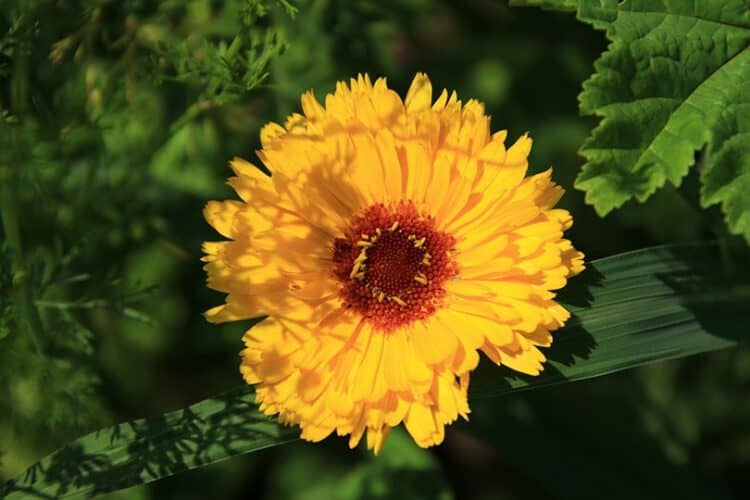These situations come up every growing season—you’re getting your yard ready for landscaping after pouring through horticultural catalogs and the next thing you know, your cat is munching on a plant that could be toxic. While you might love marigolds, it can be scary to catch your cat snacking on their flowers and leaves. So, are marigolds poisonous to cats? The short answer is that they are probably not poisonous, although it depends.
Types of Marigolds
You’ll find two main groups of marigolds: the Garden Marigold (Calendula officinalis) and the French Marigold (Tagetes spp.). The two have many cultivars with annuals and perennials available.
The Garden Marigold is one of the most popular. According to the American Society for the Prevention of Cruelty to Animals, they are non-toxic to cats and dogs. However, that statement only scratches the surface. It’s always possible that your pet can have an allergic reaction to these flowers. Signs include:
- Hives
- Itching
- Redness
- Frequent licking
- Swollen face
This can be a serious condition, depending on how strongly your cat reacts to the marigolds. We strongly urge you to contact your vet if you notice these symptoms in your pet. It may require emergency treatment in some cases.
The French Marigold is another story, particularly for cats. They are often more susceptible to an adverse reaction. You may notice signs similar to an allergic reaction. Your kitty may also experience nausea, vomiting, and gastrointestinal distress.
Wild varieties of unrelated marigolds also exist, each with varying degrees of toxicity. Marsh Marigold (Caltha palustris) is one example. This plant is poisonous, often requiring veterinary attention. The problematic toxin is protoanemonin. It can cause mouth and gut irritation. It can cause symptoms such as:
- Drooling
- Confusion
- Weakness
- Seizures
Fortunately, these plants grow in places that your cat may not regularly encounter unless they roam outdoors. They are usually found in areas that felines tend to avoid, such as wetlands and shorelines.

What You Should Do
Bear in mind that anything new that your cat eats can cause a reaction. Sadly, it’s next to impossible to know if your pet will have a problem with marigolds until they start to show symptoms of discomfort. That’s why it’s essential to vet new plant species before bringing them into your home. It’s also another reason to keep your cat indoors.
If your cat has an issue with ingesting marigolds, you’ll notice the effects soon after it has eaten the flowers. Most times, it’s not a serious problem. If your kitty does react to it, it should wear off within an hour or so. Keep an eye out for the evident signs of an allergic reaction, which may require a trip to the vet.
Keep your pet confined if possible. Of course, cats will be cats, which may be easier said than done. Remember that a feline’s natural reaction to health issues is to hide the symptoms. Keep a very close eye on them to be sure that they aren’t sick.
The Normal Feline Diet
Marigolds or other vegetation don’t play a prominent role in a cat’s diet because these animals are obligate carnivores. The feline digestive system evolved to optimize the metabolism of these food sources and body structures, such as carnassial teeth. Of course, cats occasionally eat grass and other non-typical foods, although they tend to avoid anything that isn’t meat.
Final Thoughts
Marigolds aren’t a serious problem in most cases. Cats can eat them without ill effects unless they are allergic to them or the plants are a problematic type. Watchful observation is the best action if you’ve noticed that your pet has eaten some of these flowers. Hopefully, it will be uneventful without any symptoms.
Featured Image Credit: Pixabay














